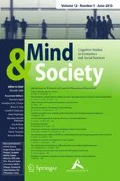Abstract
Causal descriptivism and its relative nominal descriptivism are critically examined. It is argued that they do not manage to undermine the principal conclusions of the new theory of reference.
Similar content being viewed by others
Notes
Sometimes it is taken as a form of causal descriptivism (see, e.g., Kroon 1987).
Some later-day descriptivists, e.g., Katz, defend descriptivism (in their favorite form) only as applied to proper names, not to general terms. But this is odd; Frege’s puzzles arise equally seriously with proper names and general terms. Such a local descriptivism is thus quite artificial, for it leaves the puzzles totally unsolved in the case of the latter.
I do not intend to suggest that all philosophers mentioned above in connection with causal descriptivism and nominal descriptivism assume that the relevant descriptions are synonymous with the expressions in question. Kroon and Jackson, for example, explicitly deny this (although Jackson nevertheless says that names abbreviate descriptions I find this extremely puzzling). However, in my mind this amounts to changing the subject. See also the conclusions below.
What the arguments below require is only that meanings are at least in principle shareable and not essentially private; whether or not meaning is common to all speakers of a language is irrelevant for them.
Kroon, however, thinks that descriptivism need not solve Frege’s Puzzles; clearly his idea of descriptivism is very different from the usual one. For example Searle and Katz, on the other hand, think that it needs, and manages, to do that.
References
Bach K (1987) Thought and reference. Oxford University Press, Oxford
Devitt M, Sterelny K (1999) Language and reality. 2nd edn. Blackwell, Oxford
Jackson F (1998) Reference and description revisited. Phil Perspectives 12:201-218
Katz JJ (1990) Has the description theory of names been refuted? In: Boolos G (ed) Meaning and method: Essays in honour of Hilary Putnam. Cambridge University Press, Cambridge, pp 31–61
Katz JJ (1994) Names without bearers. Philos Rev 103:1-39
Kripke S (1980) Naming and necessity. Harvard University Press, Cambridge
Kroon F (1987) Causal descriptivism. Australas J Philos 65:1-17
Lewis D (1984) Putnam’s paradox. Australas J Philos 62:221-36
Lycan W (2000) Philosophy of language. Routledge, New York
Putnam H (1975) The meaning of “meaning”. In: Gunderson K (ed) Language, mind and knowledge. University of Minnesota Press, Minneapolis, pp 131-193
Putnam H (1983) Reference and truth. In: Putnam H (ed) Realism and reason, Philosophical Papers. vol 3. Cambridge University Press, Cambridge, pp 69-86
Searle J (1967) Proper names and descriptions. In: Edwards P (ed) The encyclopedia of philosophy. vol 6. McMillan, London, pp 487-491
Searle J (1983) Intentionality: An essay in the philosophy of mind. Cambridge University Press, Cambridge
Soames S (2001) Beyond rigidity: The unfinished semantic agenda of naming and necessity. Oxford University Press, New York
Acknowledgments
This article is a revised version of a paper presented at the ESPP (European Society for Philosophy and Psychology) Congress 2003 held in Torino from the 9th to the 12th of July. The Rosselli Foundation was the local organizer of the event.
Author information
Authors and Affiliations
Corresponding author
Rights and permissions
About this article
Cite this article
Raatikainen, P. Against causal descriptivism. Mind & Society 5, 78–84 (2006). https://doi.org/10.1007/s11299-006-0010-6
Received:
Accepted:
Published:
Issue Date:
DOI: https://doi.org/10.1007/s11299-006-0010-6



